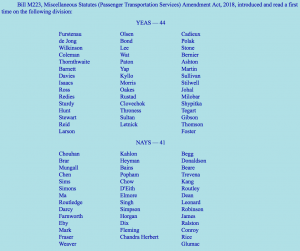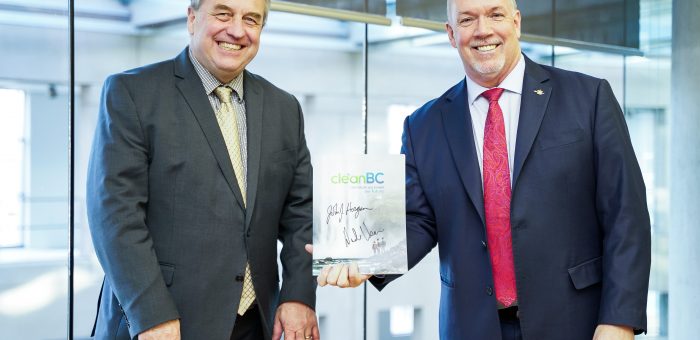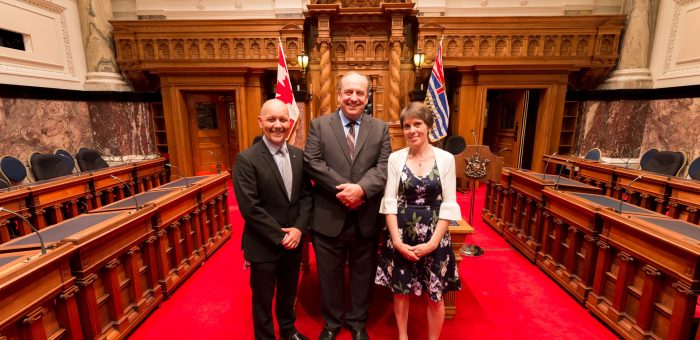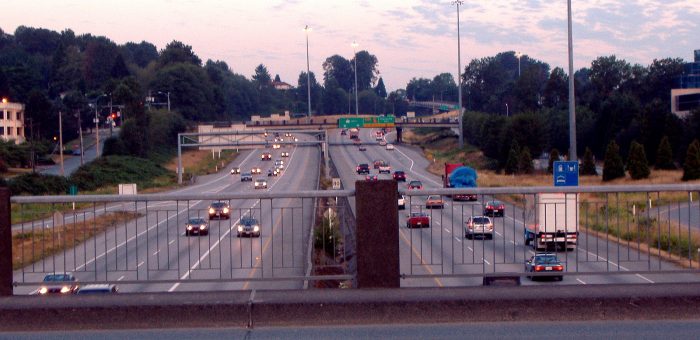From laggard to leader: CleanBC repositions BC as a leader in the 21st century low carbon economy
 Today I joined Premier John Horgan, Minister George Heyman and Minister Michelle Mungall in Vancouver to announce British Columbia’s new CleanBC economic plan aimed at positioning BC as a leader in the 21st century, low carbon economy.
Today I joined Premier John Horgan, Minister George Heyman and Minister Michelle Mungall in Vancouver to announce British Columbia’s new CleanBC economic plan aimed at positioning BC as a leader in the 21st century, low carbon economy.
This announcement was very important to me as it represented the culmination of several years work. As anyone who watched the documentary Running on Climate will know, I originally ran for office in 2013 with the BC Green Party as a point of principle — I could not stand by and watch Gordon Campbell’s legacy of leadership in the low carbon economy be dismantled by the Christy Clark government.
Today’s announcement repositions BC on the path to realize a 40% reduction in greenhouse gas emissions, relative to 2007 levels, by 2030. What’s especially exciting about today’s announcement is that it re-emphasizes the reality that reducing greenhouse gas emissions will lead to economic opportunity and prosperity for BC.
Below I reproduce the speaking notes I was planning to follow (although I went off script) along with the accompanying press release, and my overall reaction to the plan (in video).
Speaking Notes
 Over the last 150 years, Earth has made a transition from the past, when climate affected the evolution of human societies, to the present, in which humans are affecting the evolution of climate and weather.
Over the last 150 years, Earth has made a transition from the past, when climate affected the evolution of human societies, to the present, in which humans are affecting the evolution of climate and weather.- What we are at risk of losing on this planet – what has already started to die off or slip away – is staggering.
- And today, as I speak to you, we are at a pivotal moment in human history: Our generation is responsible for deciding what path the future climate will take.
- We will either be complicit in allowing climate change to despoil our world – or we can fight for a different outcome for our children.
- As Sir David Attenborough said Monday in Poland at the UN Climate talks, “If we don’t take action, the collapse of our civilizations and the extinction of much of the natural world is on the horizon.”
- As a climate scientist, I have spent my entire adult life consumed by this threat and the opportunities that will come with it.
- As a professor at the University of Victoria, my students would ask me, year after year, why so little progress was being made to combat climate change. In response I would encourage them to get involved with leaders who took global warming seriously or, if there were none, to consider running for office themselves.
- I tried to take my own advice.
- In 2007, I had the honour of being on the Climate Action Team that advised Premier Gordon Campbell.
- That work led to B.C. becoming the first jurisdiction in North America to put a price on carbon.
- B.C. stood as an example of how putting a price on carbon is perfectly compatible with prosperity.
- Our emissions dropped as our economy grew.
- And when I saw that leadership and progress being dismantled by the administration that followed, I put my name forward for public office.
- I knew I would not be able to look my kids in the face if I didn’t do everything I possibly could to fight for their future.
- That fight has not been easy.
- But I am very happy and proud to be here today, to be here to say that it has been worth it.
- By tackling climate change, with carefully designed policies, B.C.’s economy can grow in new ways.
- CleanBC offers a pathway for B.C. to be on the cutting edge of the low-carbon economy.
- This plan is a vital first step towards keeping B.C.’s climate commitments.
- Climate change is daunting and overwhelming, yes, but within every challenge lies opportunity.
- We worked hard to ensure that CleanBC is not just a climate plan – it is an economic vision.
- It is not just the Ministry of Environment’s responsibility – it is an all. of. government approach.
- B.C. has all the strategic advantages needed to seize low-carbon economic opportunities and this plan will ensure we maximize our full potential.
- I have long believed that our children and grandchildren will ask us one of two questions when they look back at the beginning of this century.
- It will either be: “How could you let this happen?”
- Or, if we choose a different path, they will ask: “How did you solve this problem when so many said you couldn’t?”
- To be a climate scientist one must be an optimist. Frankly, I’ve found it helps you survive politics too.
- I am convinced my children will one day ask me the second question. And when they do I will answer:
 “We prevailed because we worked together. We saw the threat and we knew we had to deal with it.”
“We prevailed because we worked together. We saw the threat and we knew we had to deal with it.”- I am greatly encouraged by the spirit of hope and collaboration in which this plan was written and thank the government, in particular Minister Heyman, for their efforts in this regard.
- There is much work still to be done, but today I feel we are one step closer to that brighter future.
- Thank you again, to everyone who has helped us get here.
- Please join me in welcoming Minister Heyman.
Media Release
Weaver: B.C. climate plan offers pathway to low-carbon economy
For immediate release
December 5, 2018
VICTORIA, B.C. – Andrew Weaver, leader of the B.C. Green Party, says the CleanBC plan released today offers a pathway for B.C. to be on the cutting edge of the low-carbon economy. Weaver says the plan is a vital first step towards keeping B.C.’s climate commitments and looks forward to building on this progress in the months ahead.
“This plan offers a pathway for B.C. to have a thriving low-carbon economy,” said Weaver.
“Climate change is the most significant challenge facing humanity. Each megatonne of carbon we take out of the equation will bring us closer to limiting global warming, in turn limiting the economic damage, social upheaval and human suffering threatened by climate change. British Columbians should be proud that this plan can make a difference.
“Within every challenge lies opportunity. This is why we worked hard to ensure that CleanBC puts a vision for B.C.’s economy at its centre. B.C. has all the strategic advantages needed to seize low-carbon economic opportunities and this plan will ensure we maximize our full potential. I am greatly encouraged by the spirit of hope and collaboration in which this plan was written and thank the government, in particular Minister Heyman, for their efforts in this regard.
“This has been a year of hard choices for our Caucus. The decision of the government to go ahead with LNG was a low point. I will always argue that the development of new large fossil fuel infrastructure is inconsistent with our commitments under the Paris Agreement. But this plan, and the preliminary work we have done on how we will achieve the remaining reductions, give me confidence that our targets may be within reach and that they are certainly worth fighting for. I am pleased that the plan will be backed up with funding in the next budget, and that the government has agreed to enact an accountability framework to hold the current and future governments to account.
“Climate change will test every modern leader and history will judge each of us by our actions. We must come together around our shared desire to secure a bright future for our children and grandchildren and advance every available solution to limit global warming. This will require us to sit at the table with people from across the political spectrum and stay at the table even when we don’t always get exactly what we want. The scale of this challenge calls on us to ask not what is the least we can do, but what is the most we can achieve.
“This plan is a commendable start and I am proud of the work we have done to get it to this point, but we need to keep pushing forward. The time for decisive action is now and we will keep fighting for better.”
-30-
Media contact
Jillian Oliver, Press Secretary
+1 250-882-6187 | jillian.oliver@leg.bc.ca
Video of Overall Reaction
Forest Management practices in British Columbia: An exchange in Question Period
Yesterday during Question Period I rose once more to ask the Minister of Forests, Lands, Natural Resources and Rural Development about British Columbia’s forest industry. In the first question I once more asked the Minister about glyphosate (Roundup®) spraying in BC forests. This was the topic of a question I asked the Minister on November 7. In my supplemental question, I asked the Minister what he will be doing in 2019 to overhaul our important forestry industry in British Columbia.
What’s remarkable about this exchange is that as I started my initial question, Ben Stewart, the MLA for Kelowna West, heckled me loudly suggesting that I was not asking important questions. It was a head turner for me as I had just witnessed two days of the BC Liberals’ outrageous behaviour in Question Period. In fact, over the course of this entire session, the BC Liberals have asked the same questions over and over again. Very few of them have any relevance to issues that matters to British Columbians except those who take delight in the political posturing of the BC Liberals through gotcha politics.
Below I reproduce the video and text of the exchange during Question Period. Those watching the video will note the spoonerism glysophate instead of glyphosate. This was unintentional and reflects the fact that when I speak fast I sometimes utter spoonerisms.
Video of Exchange
Question
A. Weaver: A few weeks ago, I asked the Minister of Forests, Lands, Natural Resource Operations and Rural Development when B.C. would stop spraying our forests with….
Interjection.
A. Weaver: It’s interesting, as I got interrupted by a member opposite, suggesting that asking about this is not important. Rather, what it’s important, it seems to me, is the, frankly, shocking games that I’m watching going on here.
So to the member from West Kelowna who doesn’t think the issue of glyphosate spraying in British Columbia forests is important, I continue. Glyphosate kills the species that provide an essential line of defense against wildfires and pine beetle. In the member’s riding itself, in the riding of Kelowna West, we have pine and we have wildfire that he should be concerned about. Maybe he should be spending some time on this issue.
Glyphosate harms human health and animal health. It’s symptomatic of 20th century forest management practices, and as reported in Business in Vancouver last week, B.C.’s forest industry is currently undergoing falling lumber prices, production cuts and staff layoffs. We need to change our forest practices now if we are going to have flourishing sustainable ecosystems and industry.
Now, I recognize, again, that forestry is not an important issue for the members opposite. But it is on this side of the House. For that, I ask the following question to the Minister of Forests, Land and Natural Resources. What evidence is the minister still gathering to make a decision about the ongoing use of glyphosates given that the evidence seems to be very clear that we should stop now?
Answer
Hon. D. Donaldson: I welcome the question from the Leader of the Third Party. I welcome the question because it’s of interest to people in rural areas, and natural resource management is of interest to people across the province.
We’re committed to protecting the important biodiversity of forests while ensuring a continued vibrant forest sector. As the member knows, the herbicide glyphosate is approved by Health Canada for weed control and is used selectively in northern B.C. to improve survival and growth of seedlings and young trees.
Recently the ministry started to allow increased levels of aspen and broadleaf in managed stands throughout B.C., which will lead to a further decline of the use of herbicides. In fact, in certain ecosystems, up to 1,000 aspen per hectare are acceptable in conifer plantations. Overall, the use of glyphosate is decreasing. We will continue to look at any evidence to improve silviculture strategies in the province.
Supplementary Question
A. Weaver: Indigenous peoples have managed forests for their ecological, cultural and economic value for thousands of years. There’s substantial traditional knowledge surrounding forest management, and every recent report on forestry and fire has highlighted the need for Indigenous collaboration and leadership.
Another issue clearly not an important question for the member for Kelowna West is this: UBC has proposed a national Indigenous forestry school for their Okanagan campus. If developed, this program will establish a holistic curriculum that integrates Indigenous knowledge to deal with wildfire and forest health, wealth creation and governance, and how to maximize the value of our forests.
This concept is a perfect example of reconciliation and innovation in an era of climate change and, frankly, an issue that I think we should be discussing here in question period rather than the games that we’re seeing played opposite.
To the Minister of Forests, Lands and Natural Resources, there are a multitude of opportunities like the one proposed by UBC. We can and need to do better now, not tomorrow. What exactly will the minister be doing in 2019 to overhaul our important forestry industry in British Columbia?
Answer
Hon. D. Donaldson: You know, I haven’t had, in all of this fall question period session, the ability to touch on the wildfire situation that occurred in 2018. The member used wildfire examples in his question. I would just like to say, and ask all members to join me, in congratulating the B.C. Wildfire Service staff, the contractors and the volunteers who ensured that not one single life was lost in the entire 2018 season.
The member touched on a number of topics. I’ll be brief in my answer, but I wanted to first acknowledge the efforts that UBC’s faculty of forestry is bringing — I met with the dean, John Innis — to create an Okanagan campus national Indigenous forestry school. I know the Minister of Advanced Education is aware and eagerly awaiting to receive a proposal around that.
That’s in order to blend and ensure that Indigenous traditional ecological knowledge is combined with western knowledge to better manage the forest sector. That will involve ensuring that the forest sector is productive and ensures that we’re managing with both First Nations and western science.
Marking action on key priorities, improvements to legislation
Today was the final day of the fall legislative session. The house will resume sitting on February 12, 2019. At this time the government will introduce a new Speech from the Throne.
Below is the media statement my office released in association with the rising of the house.
Media Release
B.C. Greens mark action on key priorities, improvements to legislation
For immediate release
November 27, 2018
VICTORIA, B.C. – Andrew Weaver, leader of the B.C. Green Party caucus, closed the end of the Fall legislative session noting action on key B.C. Green priorities and key improvements to government legislation.
“This was a very productive session for our caucus,” said Weaver.
“We saw action on a number of important issues we have long championed, such as demand-side housing action, lobbying reform, changes to the Agricultural Land Reserve, reform of the professional reliance model and a revitalization of the environmental assessment process. These policy changes will strengthen our democracy and help ensure B.C.’s long-term prosperity and quality of life. I thank the Ministers for their hard work and collaborative approach to these policies.”
Lobbying and the professional reliance model reform were signature B.C. Green Party platform policies, which both the B.C. NDP and B.C. Greens committed to actioning in their Confidence and Supply Agreement (CASA). Commitments to revitalize the ALR and the environmental assessments were also a key CASA commitments.
“Our Caucus was also able to improve important pieces of legislation, securing the passage of amendments to the Speculation and Vacancy Tax and the government’s ride-hailing legislation,” Weaver continued.
“I am greatly encouraged by these instances as examples of how opposition parties working in a minority government can help produce more balanced in legislation. In both cases, we drew our concerns from listening to the public and stakeholders, ensuring their voices were heard in the Legislature.
“Towards the end of the session we also participated in the initial announcements from the upcoming climate plan, the ZEV standard and social housing retrofits. Actioning an innovative climate plan that puts an economic vision at its centre is the single best thing we can do to set our province up for success. Collaborating with government on this file has been a highlight of our working relationship and I look forward to the release of the full plan very soon.”
-30-
Media contact
Jillian Oliver, Press Secretary
+1 250-882-6187 | jillian.oliver@leg.bc.ca
Changing the Terms of Reference of the Legislative Ridehailing committee
Yesterday my colleague Adam Olsen successfully negotiated an important amendment to the government legislation to enable ridehailing. As I noted earlier, his amendment added much needed flexibility to the Passenger Transportation Board’s test for approving ride-hailing licenses.
During committee deliberations, Adam was also able to convince the Minister of Transportation to change the Terms of Reference of the Legislative Committee that will provide recommendations on the regulations to be attached to this bill. Such a change required a motion to be passed in the House and we debated that motion this afternoon.
Below I reproduce the video and text of my brief speech in support of the motion.
Video of Speech
Text of Speech
A. Weaver: I rise in support of the amendment that’s before us on the original motion 34. I wish to address a couple of issues. One, of course, is what we passed yesterday in the Legislature is enabling legislation that sets the framework by which a regulatory environment will be implemented to allow ride-hailing in British Columbia.
What government has done here is recall the Standing Committee on Crown Corporations, a committee that I served on last year, to advise it on the regulatory environment that should be put in place. As amended here, there are a few other things that have been added into that regulatory environment that we felt were critical.
I recognize the member for Kamloops–North Thompson was not in the Legislature in the last four years. But this is the first time, in my view, that a legislative committee is being put together to actually advise on the regulatory environment that should be applied in enabling legislation. So I’m less cynical than the member for Kamloops–North Thompson on this.
As a member of the previous committee, I would say that I thought we did a lot of good work. I know the member for Surrey South was on that committee. The member for Richmond-Queensborough was on that committee. The member from North Delta was on that committee.
We did not have a consensus report. We had some consensus recommendations, but there were areas where there was disagreement. In the committee, those on the committee will recall that, in fact, my views were, frankly, a little more similar to members of the official opposition’s views than, perhaps, the government’s views.
We’ve now got to a situation where we have a framework in place. This amended motion is tasking the same committee to make recommendations on the actual regulations that will be in place. I’m actually quite excited by this, as somebody who’s been working on this file for quite some time.
Now, I recognize that ride-hailing is not going to open tomorrow. But we have been in touch with the major ride-hailing companies. I, personally — and my colleague more recently — have been in touch on an almost daily basis with these companies.
We know, despite what you have heard here, that they needed and wanted the legislation to pass yesterday. The reason why is that this is the first time a door has been opened that they want to enter into. There were some critical things that had to be put in place for them to actually want to walk through that door.
That critical thing was what my good friend from Saanich North and the Islands did, through the introduction of an amendment to the Passenger Transportation Board’s framework, which could have potentially blocked ride-hailing from coming in. The passage of that amendment has enabled major ride-hailing companies to walk through the first door.
Now they’ve gone through the open door, the first door. There’s no doubt there are a number of other smaller doors before them, those doors being the regulatory environment. As my colleague from Saanich North and the Islands has indicated, we are concerned that we get good public policy that will bring ride-hailing as soon as possible to this province.
We’re ensuring. We believe this amended motion, particularly the amendment, enables the legislative committee to ensure that those secondary doors do, indeed, open. Because as amended, allowing the discussion of things like class 5 versus class 4 licences — a lot of people get hung up on that.
When you actually go into the area of class 5 versus class 4, there are really certain things in class 4 that I think most people would agree are appropriate for class 5. Those are the age requirements, health checks, safety of car, etc. But does it actually need to have class 4 or class 5? This is an issue that the committee can now look at. This was a critical issue that could’ve potentially blocked one of the secondary doors opening.
On that note, I think that this is an advancement of public policy in a fine way. It’s allowing a legislative committee, for the first time in my recollection, to actually be in a position to advise government on the regulatory — not the enabling framework. That’s was what we did with the first committee. We advised on the enabling framework. Now we’re actually advising on the regulatory environment. With that, I will take my seat as a strong supporter of the amendment
BC Liberals continue to play games on ridesharing
In what can only be described as a political stunt, the BC Liberals introduced a private member’s bill today entitled: Miscellaneous Statutes (Passenger Transportation Services) Amendment Act, 2018.
This private member’s bill was introduced by Jordan Sturdy and apparently represents a legislative framework that the BC Liberals would have brought in to enable ridesharing if they had won the last election. Now all things being equal, you might find it odd that I voted against it at first reading. But I felt it was important for me to signal that I am not interested in political stunts but rather want to advance good public policy.
It was clearly a political stunt for a number of reasons:
1) Proponents of ridesharing have been trying to bring it to BC since 2012 while the BC Liberals were in government. The BC Liberals ignored the file and had ample time to advance their views when they were in government. It’s odd that they chose the day before the legislature rises to introduce legislation.
2) I twice brought in a private member’s bill under the BC Liberals that would have enabled ridesharing in 2016 and 2017. Neither time did the BC Liberals see fit to call my bill for debate. If the BC Liberals really wanted to debate this issue with the goal of advancing ridesharing they would have called my bills for debate in either April 2016 or February 2017 (prior to the provincial election).
3) The BC Greens negotiated with the BC NDP to establish an all-party committee that met with stakeholders last year. In fact, Jordan Sturdy was on that committee. Why were the issued raised in this bill not brought forward through that process?
4) Finally, the BC Liberals have been serving in opposition now for well over a year. If they really were sincere with their desire to introduce ridesharing, why did they not introduce their bill sometime over the last year? I introduced my bill a third time but this time under the NDP government last fall. The BC Liberals waited instead to table their bill one day before the house rises.
 Right now in the Legislature there is a government bill before the house whose purpose is to enable ridesharing in BC. The BC Greens have a number of substantive concerns with this bill and are working diligently to ensure that appropriate changes are made. We are in near daily contact with two major ridesharing companies in order to hear from them and to keep them abreast of our activities.
Right now in the Legislature there is a government bill before the house whose purpose is to enable ridesharing in BC. The BC Greens have a number of substantive concerns with this bill and are working diligently to ensure that appropriate changes are made. We are in near daily contact with two major ridesharing companies in order to hear from them and to keep them abreast of our activities.
My colleagues Adam and Sonia voted with the BC Liberals on first reading (see vote results to my right). The BC NDP followed my lead and voted against it. First reading passed (thanks to the support of my colleagues) and so the bill will make it to the order papers. But it will die there as tomorrow is the last day the legislature sits before the February 2019 throne speech.
At the end of the day, my colleague Adam Olsen brought forward an important amendment that passed. This amendment greatly improved the Passenger Transportation Board’s test for approving ride-hailing licenses, adding much needed flexibility. Below I reproduce the media release that our office issued in response to the passing of our amendment.
Media Release
B.C. Greens pass major amendment to government’s ride-hailing legislation
For immediate release
November 26, 2018
VICTORIA, B.C. – Adam Olsen, B.C. Green Party spokesperson for transportation, is
celebrating the passage of his amendment to the government’s legislation to enable ride-hailing
in B.C.
“This amendment greatly improves the PTB’s test for approving ride-hailing license, adding
much needed flexibility,” said Olsen.
The amendment changes the way the PTB applies its three part test when it is approving an
application. The new language ensures that the board can consider the three components more
dynamically, factoring in the reality that ride-hailing presents a new business model for the
passenger directed vehicle industry. This change doesn’t require the PTB to change its
practices immediately, but ensures that as new policy direction is given, it has the legislative
flexibility to ensure it can embrace innovation while maintaining its role as a regulator.
“Although regulating ride-hailing through the PTB is not the approach we would have taken had
we been in government, as an opposition party our job is to improve legislation and find a path
forward to deliver on our priorities.
“Our goal is to strike the right balance between our responsibility to ensure public safety, a fair
playing field for business and delivering on our promise to make ride-hailing available for British
Columbians. Our view is that the government’s approach was excessively prohibitive, while the
B.C. Liberals were in favour of almost complete deregulation. Other jurisdictions with lax
ride-hailing regimes have experienced issues and it’s important that we learn from their
experiences. I believe this amendment, as well as the agreement by the Minister to amend the
terms of reference for the legislative committee that will recommend regulations to include
licensing requirements, are positive steps towards a fair and balanced ride-hailing regime.”
Olsen also noted that much work remains to be done in the legislative committee that will
recommend ride-hailing regulations to government.
“I look forward to working with my colleagues from all parties on the legislative committee to
ensure B.C.’s ride-hailing regime strikes the right balance. Our current view is that Class 5 with
additional requirements to ensure public safety would be the best approach, and that is the
regulation we will encourage the B.C. Liberals and the B.C. NDP to join us with recommending
to the Minister. I hope the government will accept the recommendations put forward by a
majority of the committee, as they will represent a majority of seats in the House.”
-30-
Media contact
Jillian Oliver, Press Secretary
+1 250-882-6187 | jillian.oliver@leg.bc.ca







